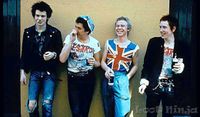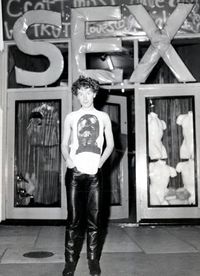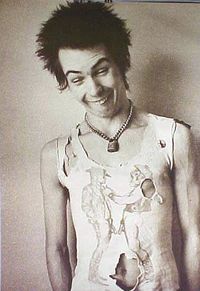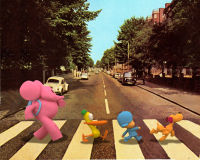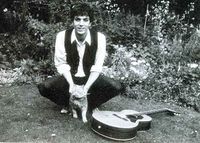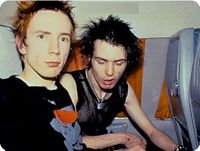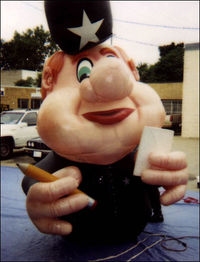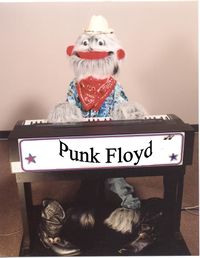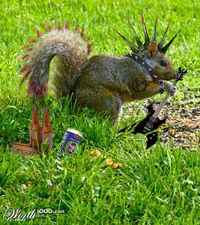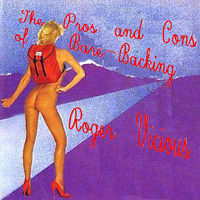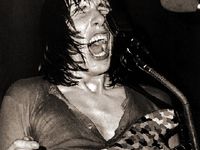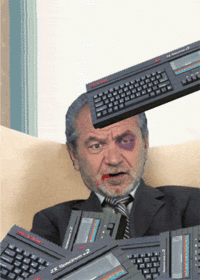Punk Floyd
The post-war years were a dull period in Britain with bomb damage still evident and the skies almost permanently leaden grey. Punk Floyd exploded out of this unpromising time in 1964, fusing the disaffection of urban youth with a love of both free-form jazz and hardcore rock and roll. They made their name performing spacey improvisations and then sensationally compressing them into rigidly 4/4 thrashes. Soon they would graduate from performing in back street pubs to audiences of friends, to small concerts in front of contemplative students swaying gently to the music as they spat at bassist, Roger Vicious, and finally on to headlining in stadia across the globe. Just how did this unlikely foursome come to conquer the musical world?
Early days
Unemployed architects Roger Vicious and Syd Barrett grew up in Oxford, England and found themselves together in the swinging London of the 1960s. Together with keyboard-playing singer Rick Rotten they took their first tentative steps towards stardom as The Strand initiating the progressive punk tradition of “This is a chord, this is another, this is a third. Now find a fourth that no one has heard before and form a band.”
Barrett’s unusual guitar style and the pastoral, almost childlike imagery within his lyrics contrasted sharply with the driving rhythms of newly recruited drummer/vintner, Paul Mason, and a stage act that centred on attacking domestic animals with chainsaws. The combination proved irresistible. “People asked how we could put the twenty minute improvised jams from our live performance into three minute singles,” Rick said in an interview with Melody Maker in 1967. “But we just play all the same notes really quickly.”
Visually Punk Floyd were unlike anything Britain had seen before, with psychedelic safety-pins piercing their faces and unique drain-pipe flairs, frequently spattered with the entrails of recently attacked livestock. Soon the band came to the attention of would-be manager and committed rent-boy, Malcolm McClaren. “I saw Punk Floyd on stage and my first thought was ‘Phwoar, fancy some of that’. Syd more than Roger, really, he had the nicer arse.”
Punk Floyd signed with McClaren’s management company Ego-Trip and began to hang-out in Soho at the shop he owned with Vivian Westwood, the notorious “Crumpet”. It was here that the world first heard the Punk Floyd classic "See Emily Die". Paul Mason explained: "Syd had been awake all night popping uppers and mugging OAPs in Chelsea. One of them got a bit lippy, so he knifed her. Her name was Emily and Syd spent her pension on Mandrax. I think the high he got inspired the song. He was always a big softie at heart – despite the violence."
But it would be some time before "See Emily Die" reached the charts, and Punk Floyd were still unknown outside the capital.
Underground heroes
London in 1966 was not short of bands - every one of them, it seemed, playing "Louie Louie". Punk Floyd were no exception, their act included the usual standards by the Rolling Stones, The Kinks and Bo Diddley but, almost uniquely, Barrett insisted on interspersing these with original compositions. Syd would never be content to be a mere copy-cat. He scornfully rejected the political idealism and flower power silliness of the Californian hippie myth that was becoming trendy, replacing it with nihilism and songs about gnomes named Grimble Cromble.
“The whole idea of the band is about getting laid,” explained Syd to the NME disingenuously in 1968. However, it was clear to everyone that there was a great deal more to Punk Floyd than just sex. Looking back, Roger Vicious agrees: “We started Punk Floyd with the intention of rebelling against our own excesses – the excesses that we intended to fall into in the later part in our career.”
News of this exciting new wave of garage-progressive music spread quickly and Punk Floyd were soon the darlings of the underground, performing nightly at the Roundhouse, The UFO club and Marylebone Street Magistrates Court. McClaren was keen to cash-in and had soon persuaded EMI to record their debut single “Arnold’s Brayne” – a cheerful ditty about an English eccentric who finds himself in trouble with the law for stealing ladies underwear and later commits suicide in prison to avoid the nightmare of daily gang-rape.
“We recorded it at Abbey Road,” Rick Rotten remembered. “The Beatles were next door and we were as excited as kids. When Paul McCartney came round to say hello I almost forgot to chin him.”
While EMI were planning Punk Floyd’s assault on the Top Ten, McClaren was confirming their position as kings of psycho-thrash, organising the three day freak-out that he called “Games for Pay”. The International Times reported: “There was a light show, a giant octopus in a bath of jelly, jugglers, fire-breathing acrobats, naked chicks, glue-sniffing and, the Floyd with their new piece ‘Put that fucking axe in my head, Eugene. Most importantly, there were naked chicks.’ ”
But such simple times could not last and within weeks “Arnold’s Brayne” was number 18, Punk Floyd were on "Top of the Pops" and the world would never be quite the same.
Controversy
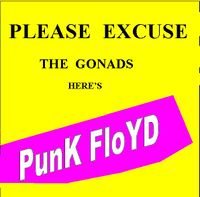
“Arnold’s Brayne” peaked at number 15 but the follow-up, “See Emily Die”, had reached number 6 before being banned by the BBC following a Daily Mail campaign objecting to its overtly violent theme and to the refrain “Princess Margaret is a man” which they claimed could be heard if the single was sanded with emery paper and played backwards at 59.75 revolutions per minute under a new moon.
The storm of controversy saw Punk Floyd invited onto Granada TV’s popular "Reg Grundy Show" where Syd added to their notoriety by injecting the host with Heroin and encouraging him to swear live on national television. Fleet Street saw red but the sensation only swelled Punk Floyd’s following and EMI encouraged the band to complete the recording of their album around a heavy gigging schedule.
“Syd wanted to call the album Piper at the Gates of Oblivion, recalled Rick Rotten. “But Malcolm insisted that it was issued as Please excuse the gonads, here’s Punk Floyd.” The album was banned across Britain, Punk Floyd were the officially the coolest band in the country and Syd, Roger, Paul and Rick were stars. But fame rarely comes without a price.
Descent of a genius
Syd had dreamt of being a star since childhood but found the reality of fame hard to handle. There were the girls, the cars, the money and everywhere the band went they were mobbed by pensioners demanding that he stab them, or finish off their cat with a chainsaw. Syd started passing-up drinking sessions with band-mates and began to retreat into himself. Where once he’d sought out attention, now he hid in airing-cupboards rocking silently backwards and forwards, clucking like a chicken. But it was worse than anyone knew.
“Syd couldn’t take it,” McClaren wrote in his autobiography. “He stopped taking the Heroin and the life just drained out of him. I packed him off on holiday with Rick and we pumped him full of smack, but it was no good, the spark had died.”
Syd’s behaviour became less and less erratic, leading his band-mates to wonder if they’d ever be able to record with him again. Nevertheless, he successfully fronted a Scandinavian tour and recorded several tracks for the next album “A Shitload of Secrets”, including the magnificent "Jugband Booze" - a track which contained the prescient lyrics:
"It's awfully considerate of you to think of me here,
and I'm most obliged to you for making it clear that I'm not here, you bastards.
And I'm wondering who will be writing your songs...
You can stick your band where the sun don't shine,
Cause all the fans in the audience are mine.
And I don't care if they listen to you,
I'll put my money with the Woolwich"
But during the band’s first American tour it was clear that his time with the band was fast drawing to a close. At a concert in San Francisco Syd, desperate to avoid consuming the wrap McClaren had provided, mixed the heroin with gel and constructed an elaborate hair-style to hide it. Under the hot stage-lights the carefully styled hair collapsed, making his face appear to melt. The audience were thrilled but McClaren was worried, it seemed that Syd was spiralling uncontrollably into chemical abstinence.
“Syd would just stand staring at the audience as they spat at him,” Paul Mason recalled. “Sometimes he’d play one note all night, which we rather liked. Other times he’d detune his guitar at random which, at the time, we took as a worrying sign of musical adventure. And he became prone to bouts of rationality – so we fired him.”
After Syd
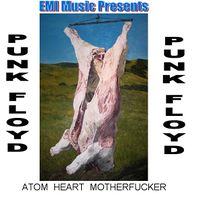
With Syd too clean to continue, McClaren drafted in Syd’s childhood friend, Glen “Lucky” Gilmour. Initially, they hoped to record Syd's work as a five piece while touring without him, but they soon found that it was easier to embezzle Barrett’s royalty cheques with him elsewhere. However, without Syd’s creative input the band found inspiration hard to come by and several subsequent albums ("Less", "Muddle" and the double album "Umm er, no new tunes. Let's do a live record.") were largely ignored by the public. Sales of their soundtracks to porn films barely covered production costs and the outlook seemed bleak.
If the band had sobered up long enough to consider their future, the dramatic decline in sales might have convinced them to give up, fortunately 1971’s “Atom Heart Motherfucker” went to number 1 in the UK chart and number 27 in the USA, providing a welcome injection of cash to pay for ever more frequent injections of narcotics. The album hinted at the future with a largely instrumental first side and a second side made up of more traditional, shorter thrashes, including the stand-out track Gilmour track: “Fat Old Sod.”
Even so, it was the following 1973 album, “The Great Rock and Roll Swindle in the Sky”, that launched Punk Floyd into a different realm. Including the singles “Analgesics in the UK”, “Vegetable Head” and “God shave the Queen” the album was a run-away success on both sides of the Atlantic.
“Suddenly we were superstars and could have whatever we liked,” Paul Mason recalls. “Mostly I wanted vintage sports cars, girls, drugs, chainsaws, the violent overthrow of traditional society and its replacement with a less rigidly hierarchical system based on individual need. Pretty much in that order, really.”
Old school-friend and graphic designer, Lightning Hopkins, provided a striking image for the album cover - a perfect optical prism being shattered by a hammer. For the next few years, this image would appear on bedroom walls across the world. With a lengthy tour behind them and millions banked and spent, the band returned to the studio in 1975 to record an elegy to their former compatriot Syd, the album that would eventually be released as “Wish you were Dead”.
"Syd turned up at the studios," McClaren claimed in his autobiography. “He looked so healthy and clean that no one recognised him. Eventually, I realised who he was but it was a shock; where once his eyes had been like black holes in the sky, suddenly they were sparkling and full of life. I was terrified, I didn't want the band to see him so I impaled him on a fence post I found behind Abbey Road.”
McClaren buried Syd in the basement but his influence pervades the album in the title track and others such as “Shine on you Crazy Bastard, parts I to MCXVIII” , and “Have some more Horse”.
The subsequent tour was marked by even larger audiences and ever more elaborate theatrics - a laser show decimated the front row nightly, and the performance culminated in a spitfire dive-bombing the stadium after the last encore. The band reassembled for the 1977 album “Animals (being killed with chainsaws)” which was a critical success but unpopular with the record-buying public.
“People thought it was time to stop and I considered it,” Roger remembers. “But then the words of The Jacksons came back to me – Don’t stop ‘til you get enough – and I only had about £10 million at the time so we went back into the studio to recall the album that became “The Hedge”. I've tried to live my life according to the Jackson's philosophy ever since, especially "Blame it on the Boogie".”
A notable incident in Punk Floyd's career came when they flew to Rio de Janeiro to record with 'Great Train-Robber', Ronnie Biggs. Rotten duetted with Biggs on the track "Pigs - keep trying to extradite me" for which Lightning Hopkins had arranged a photo-shoot in front of Sugar-Loaf mountain including a 40 foot inflatable Biggs and an even larger London Bobby. Sudden winds broke the tethers and a bizarre cop-chase through the skies of Brazil ensued until the balloons finally landed in a remote part of the Amazon rainforest, where Biggs is still worshipped as a God by Yanamami indians.
The Hedge
Over the years Roger Vicious had become increasingly intolerant of the audience's reaction to Punk Floyd's live performance. "It was God Shave the Queen that started it. Suddenly everyone was dancing and having a good time; no one seemed interested in gobbing at us or senselessly attacking each other. I felt they were missing the point."
The idea came to him to embody the distance that had grown between him and the fans organically. He began to conceive the notion of a giant hedge growing at the front of the stage, isolating the band from their increasingly sober audience. Early live performances were disastrous; "The Hedge grew so slowly," Mason remembers. "We had to replace the leylandii with bamboo and keep it under special lights. I mean, you could actually watch that shit growing but it still took fucking hours to cover the stage, by the time it was ready we'd played our entire back catalogue three times even though Lucky played an six hour solo in Comfortably Dumb."
But the set-back only inspired Vicious to new heights of creativity. Together with composer, Bob Cratchitt, he expanded The Hedge from the original double-album to a nine-hour Duodecuple album investigating many recurrent Punk Floyd themes: madness, chainsaws, the passing of time, estrangement, madness, war, chainsaws, paranoia, death, estrangement, madness, Syd, money, and madness. Despite retailing at the price of a used car, the album was a runaway best-seller, bigger even the The Great Rock and Roll Swindle in the Sky. Once again the Floyd stormed the singles charts, this time reaching number one with "Another leaf on the Hedge, pt II".
But whatever the success of the album, the tour was a disaster. Apparently fearing assassination Vicious liquidated keyboardist/singer Rick Rotten, replacing him with robots; and staging the extravaganza was so ruinously expensive that it was only performed in its entirety six times, with less than 5% of the losses offset by sales of bamboo-shoots. Vicious though, could not let go. In 1980, buoyed by the huge royalties embezzled from Barrett, he began to produce an epic motion-picture version of "The Hedge", starring Bob Geldof in the role of the hero, Punk.
Soaring overspends saw shooting suspended in 1981 and the project was only saved by the Disney Corporation, who agreed to complete the film in return for complete creative control. Although loath to agree, Vicious had no choice and the final version surfaced briefly in 1999 as the forgettable Over the Hedge. But, the project's time had passed and children seemed no longer willing to sit still for half a day watching a divorced raccoon rock-star descend into a paranoid search for food to satisfy the ever-greater demands of a Nazi dictator-bear.
The End
The End, part 1.
By now, Vicious was convinced that he was the personification of Punk Floyd. With Rotten and Barrett dead, Gilmour nothing but a fat, Johnny-come-lately banjo-player and Mason little more than an arrhythmic make-weight it was time to stake a claim for full control. Vicious summoned his colleagues to a band-meeting in his new bunker beneath Wolfsburg and presented them with two possible projects and an ultimatum.
"There was this entirely unlistenable thing called The pros and cons of Bare-Backing," Gilmour remembered. "It had no tunes, way too many lyrics and a bird with a fit arse on the cover that Roger had already designed - I really liked it. But there was also "The Final Cunt" which just had no tunes and way too many lyrics. He told us we could make one and then fuck off or we'd be going the same way as Rick."
Despite the preference of Gilmour and Mason for "The Pros and Cons", McClaren insisted on "The Final Cunt", a homage to Vicious' father, murdered by his son while on home-leave from the army in 1944. Rolling Stone described the album as "The finest nihilist, post-Imperialist reassessment of British foreign-policy since the last album by Men without Hats." But fans were less impressed, with sales stalling at twelve despite a top 20 single, "Not Now, Dear." It seemed that time could finally be up for Punk Floyd and Vicious duly announced the band's death in the obituary column of NME.
"Punk Floyd
1964-1983
Beloved of no one.
R. Vicious (poet and philosopher)"
The End, part 2
In 1987 Lucky Gilmour found himself freshly out of Broadmoor (a UK prison for the criminally insane), at a loose end and with a mounting debt to his bookie. The solution to these problems seemed obvious: if Vicious no longer wanted to be in Punk Floyd he'd phone his old friend Mason and they'd become Punk Floyd themselves.
They converged on a house-boat on the Thames and began the creative process that would lead to that year's "A Momentary Lapse of Music". After two days the pair could agree on only four words "I hate you, Roger" to be sung over and over to the tune of "Whistle while you work". There were ominous signs that, having recovered from the creative loss of Barrett, the band would succumb to the creative loss of Vicious.
"We thought of contacting Syd but rumour had it that he'd joined the Salvation Army special forces," Gilmour reported. "We had no idea that Malcolm had put him under."
Fortunately, old friend of the band, Bob Cratchitt, appeared with the very latest technology and the project moved on.
"Bob brought a Sinclair QL, which was a ZX Spectrum in a bigger box, with a keyboard that wasn't made of jelly," Mason wrote in his autobiography. "Some clever bugger had written a program that randomly created rhyming sentences from all the entries in the Oxford Concise Dictionary. You could set the words you wanted to appear most frequently, so we typed in the usual: madness, isolation, chainsaw etc. After about six hours and it started beeping and then the printer spat out -"Disk Loading error. Line 12" which became the working title of Momentary Lapse."
Cratchitt re-booted the QL and soon they had a list of twenty songs to choose from. Within a week of release heavy American airplay of "The Frogs of War" had quickly propelled the album to number 3 in the Billboard chart. The band were swiftly back on the road.
"I figured my dealer couldn't keep pestering me for cash if I was in a different city each night," Gilmour admitted to Penthouse. "Plus, without the expense of all the bamboo from the Hedge tour we were actually making a decent profit."
A bitter legal dispute over the use of giant inflatable sex-dolls which Vicious claimed copyright over did little to spoil the feeling of elation and a live album of the tour "The Delicate Sound of Folding-Money" followed. A further album, "Flogging a dead Horse" appeared in 1995 with the familiar themes of madness, the need to generate cash and chopping up animals. Though the album was not a big seller, the tour was lucrative enough for Gilmour to invest in several Afghan poppy-fields.
Post-script
Gilmour officially declared the band dead again in 2001 to pursue a solo project "Roger on an Island" - a concept album following the imaginary life and slow starvation of Vicious once stranded on Rockall. Punk Floyd were persuaded out of retirement to perform at the G8 concert, sensationally appearing alongside Vicious.
Bob Geldof claimed:
"People had started to forget what a fecking genius I am. So I thought performing a miracle like getting the Floyd back together might get me canonised this time. Oh, and there were some hungry people in Africa, or somewhere."
Following the concert, Vicious took the opportunity to murder Mason.
Gilmour remains in hiding, thought to be in the Tora-Bora region of Afghanistan.
The robotic Rick Rotten has recently been seen advertising butter on UK Television.
See also
